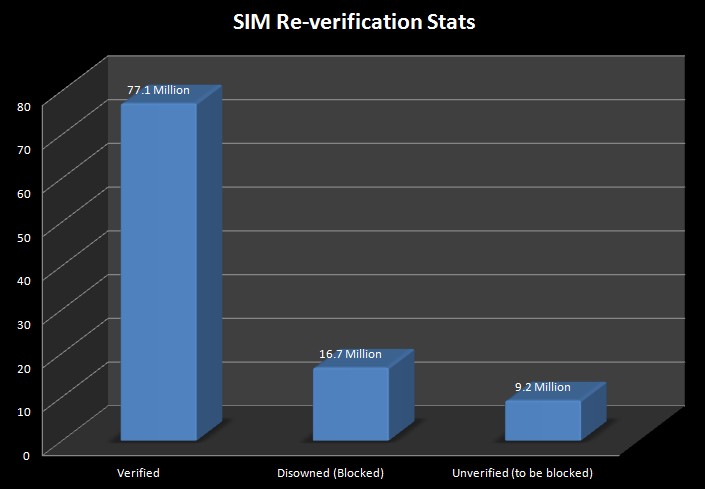26 Million SIMs Blocked as SIM Reverification Drive Ends
Posted by AAMIR ATTAA
Mobile phone companies yesterday completed a three month long biometric re-verification campaign through which 103 million prepaid SIMs were supposed to be re-verified by their legitimate owners.
Each mobile phone user was asked to go to service centre, franchise or retail outlet of his/her respective mobile operator and re-verify his identity by matching his/her thumb impression with NADRA’s database, thus ensuring that the owner of the registered SIM is indeed the legitimate CNIC holder against which the SIM is registered.
Total SIMs Selected for Re-verification
Following is the breakdown for SIMs that were to be re-verified:
- 1 and 2 SIMs per CNIC per mobile operator: 64 million SIMs
- 3 and more SIMs per CNIC per mobile operator: 30 million SIMs
- Total SIMs for reverification: 103 million
Re-verification Stats
- Verified SIMs: 71.1 Million (against 60 million CNICs)
- Disowned (Blocked) SIMs: 16.7 Million
- Unverified (to be blocked): 9.2 Million
- Total Blocked SIMs: Disowned + Unverified: 26 Million
While final stats for re-verification of SIMs are likely to be available late Monday, reports from late Saturday suggest that a total of 77.1 million SIMs were re-verified during last 90 days.
Some 16.7 million SIMs were blocked by operators as customers disowned these SIMs during the re-verification process.
With this, telcos processed a total of 93.8 million SIMs (out of 103 million target SIMs) and some 9.2 million SIMs remained un-verified that are either blocked already or are in process of getting blocked by the operators.
Mobile phone companies are asked by the regulator to submit a compliance report on Monday after blocked all unverified numbers.
This way, as a result of biometric re-verification, a total of 26 million SIMs (out of 103 million) are blocked.

What Happens to Blocked Numbers?
If you own a SIM that was not verified through biometric verification system and is blocked now, then you have to go to service centre or franchise of respective operator to get your SIM replaced after biometric verification.
You will have to pay the usual SIM replacement fee (Rs. 50 to Rs. 75) to get your SIM replaced and activated again.
You can avail this facility of SIM replacement for next 180 days, after which your number will be blocked forever and will be added to re-sale pool.
Verification for Overseas Pakistan
Pakistan Telecommunication Authority has given six months extension to those customers who are using Pakistani SIMs abroad and have verified their SIMs temporarily as per SOPs for SIMs that are on roaming.
Such SIMs, that are on international roaming, will remain active for another six months during which they are required to re-verify their SIMs with biometric verification system to avoid blockades.
Cost of Re-verification Drive
Starting January 12th, 2015, the biometric re-verification drive continued for 90 days during which more than 80,000 biometric re-verification devices (each of which costs from 350$ to 400$) were installed by cellular companies.
Not to be mentioned, this was the largest deployment of biometric devices in the world for a single project.
Mobile phone companies claim to have spent more than 60 million dollars on entire drive that ended yesterday.
Telcos say that this cost of US 60 million excludes the business loss that telcos incurred during the SIM-reverification activity and that such business loss may span over years to come.
How Successful was Re-verification Drive?
Pakistan Telecommunication Authority is calling the re-verification drive a success.
ProPakistani agrees to the claim to an extent, considering that over 60 million individuals went out of their comfort zones to get into queues for reverification of their SIMs. 26 million SIMs are blocked, and this number is almost half of earlier estimates, so yes the campaign went successful.
However, impact of re-verification of SIMs on terrorism — the sole purpose of whole exercise — is doubted. As researches have already established, the registration process of cellular SIMs — no matter how rigorous and how intensive it may get — has no connection with terrorist activities.
Terrorists are going to communicate anonymously even after the re-verification of SIMs, either through internet or through other means available. And hence the core purpose of re-verification of SIMs is going to remain unachieved.
Having said this, there are countless benefits that Pakistanis will reap after re-verification drive. End of unknown calls, end of Benazir income support prizes or any other lottery scams for that matter, ultimate end to illegal voice exchanges as no one will dare to do even the minor of misdeeds with his/her registered SIM.
Most importantly, after re-verification exercise, we have an accurate figure of mobile phone users in the country.
With accuracy in data, we are now going to have better ARPUs of telcos, and lower teledensity levels that should translate into better positioning of Pakistani telecom market and hence greater chances of investments in years to come.
The post 26 Million SIMs Blocked as SIM Reverification Drive Ends appeared first on .



